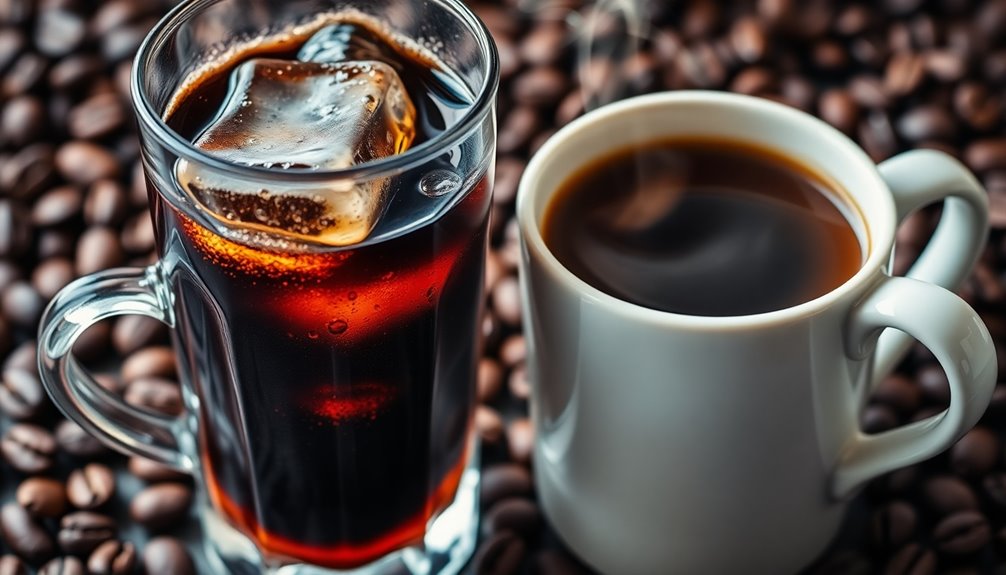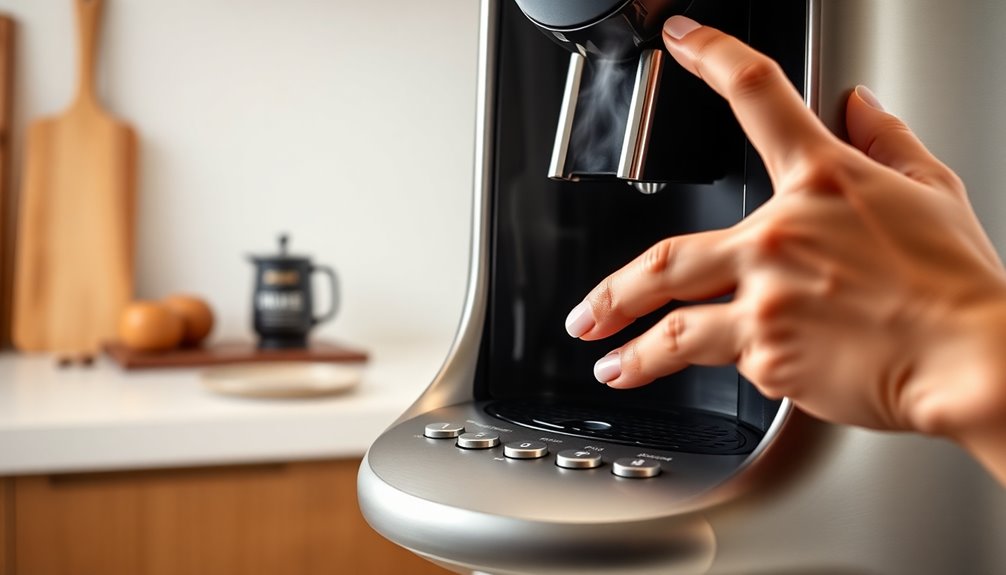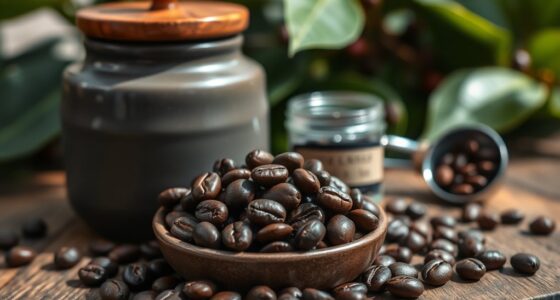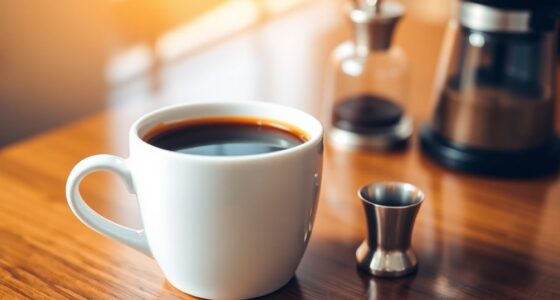When comparing cold brew and hot coffee, you'll find that caffeine content varies significantly. A standard 16-ounce cold brew packs about 200 mg of caffeine, while hot coffee ranges from 210 to 360 mg, depending on the brewing method and bean type. Hot coffee extracts caffeine more efficiently due to higher temperatures, while cold brew requires a longer steeping time. If you're sensitive to caffeine or prefer a smoother taste, cold brew might be your choice. But if you're looking for a stronger kick, hot coffee's the way to go. There's plenty more to explore about these brews!
Key Takeaways
- Cold brew typically contains around 200 mg of caffeine per 16 ounces, while hot coffee ranges from 210 to 360 mg.
- Hot coffee extracts caffeine more efficiently, reaching nearly 100% extraction in under 10 minutes with hot water.
- The type of coffee bean influences caffeine levels significantly, with Robusta beans containing double the caffeine of Arabica beans.
- Brewing methods affect caffeine extraction; cold brew requires a long steeping time of 12-24 hours, while hot coffee brews in minutes.
- Cold brew offers a smoother taste with less acidity, while hot coffee has a sharper flavor profile due to higher acidity levels.
Caffeine Content in Cold Brew
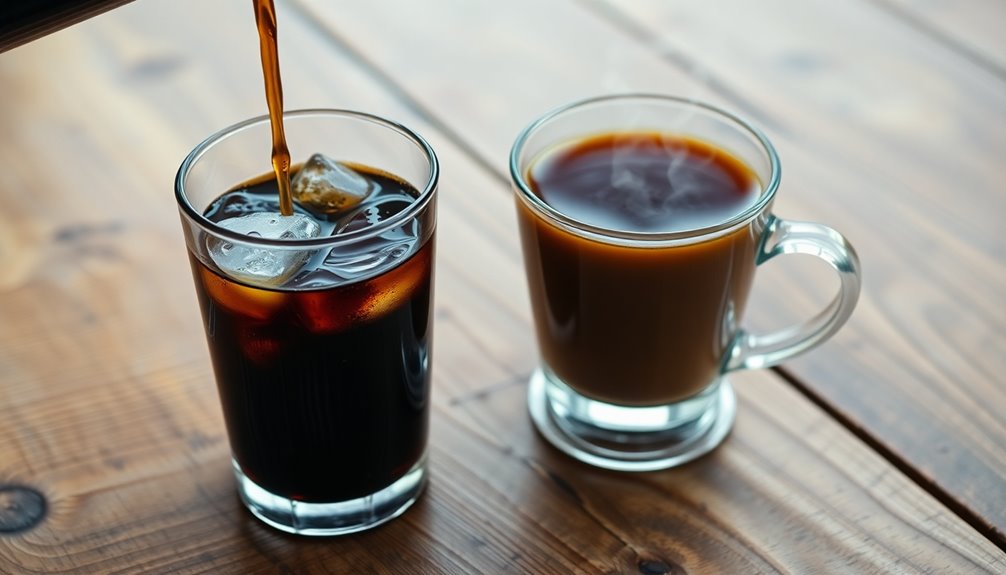
When it comes to caffeine content, cold brew coffee packs a punch. A standard 16-ounce serving typically contains around 200 mg of caffeine, but it can range from 100 to 200 mg per 8-ounce cup, depending on how it's brewed.
If you're looking for a caffeine kick, larger servings can deliver even more, reaching up to 476 mg. The caffeine extraction is influenced by factors like the coffee-to-water ratio, the type of bean, and the grind size. Cold brew generally contains more caffeine than iced coffee but less than hot coffee.
Coarsely ground beans and longer steeping times—between 8 to 24 hours—help extract more caffeine. Just remember, while cold brew often has more caffeine than iced coffee, the brewing method can lead to variations in how much caffeine you actually get.
Caffeine Content in Hot Coffee
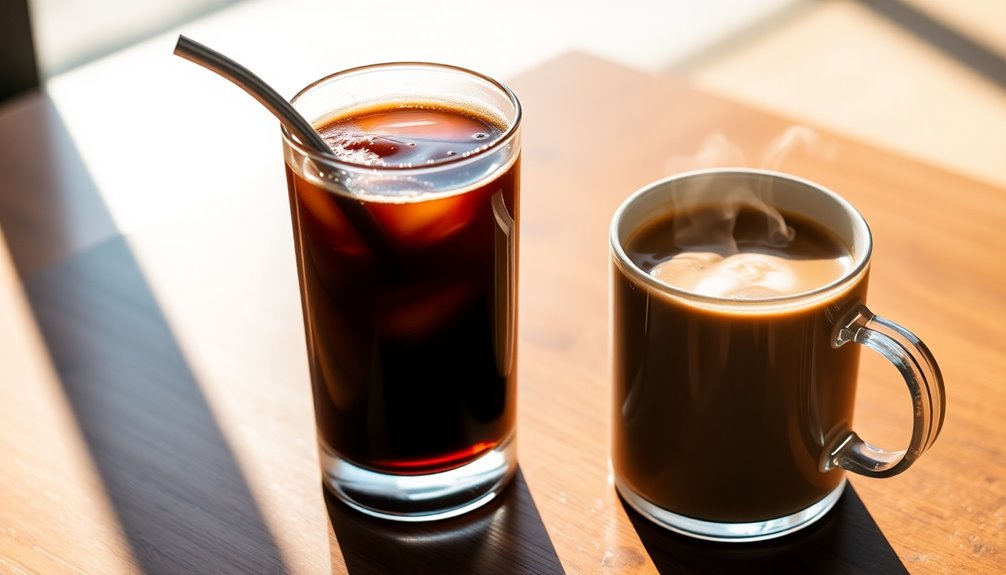
Hot coffee is known for its strong caffeine kick, thanks to the efficient extraction process that occurs at higher temperatures.
Hot water dissolves caffeine faster than cold water, allowing for nearly 100% absorption in under 10 minutes at 194°F. This is why hot coffee typically has a higher caffeine content than iced coffee. In fact, the Grande hot Pike Place medium roast has a remarkable caffeine content of 310 mg.
The brewing method and coffee-to-water ratio also play significant roles; methods like French press and drip coffee extract more caffeine due to longer brewing times.
The type of beans matters too—Robusta beans contain more caffeine than Arabica.
Serving size impacts total caffeine as well; an 8-ounce cup generally has around 95 mg, while larger sizes can reach up to 330 mg, offering a potent caffeine boost.
Factors Influencing Caffeine Levels
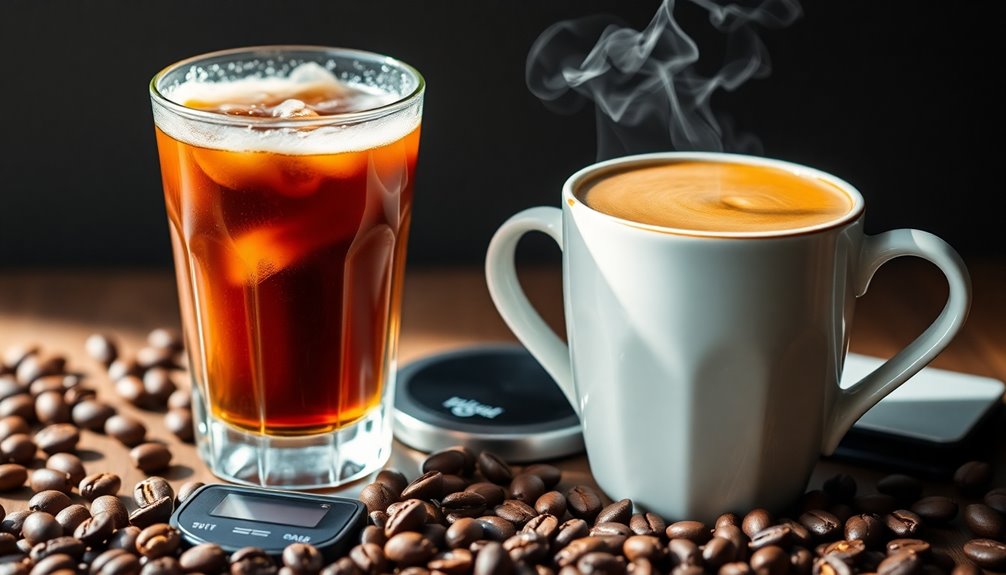
Caffeine levels in your coffee can vary widely based on several factors beyond just the brewing method. The type of coffee bean you choose plays a significant role; for instance, Robusta beans contain about twice the caffeine of Arabica beans. Additionally, the caffeine content of the beans you select can greatly influence the overall caffeine levels in your beverage. The roast level of the coffee can also affect the caffeine content; lighter roasts generally retain more caffeine than darker ones due to the roasting process. Moreover, the serving size you choose dramatically impacts the total caffeine intake, as larger servings naturally contain more caffeine. Understanding these factors is essential for discerning caffeine levels in popular coffee types, enabling you to make informed choices about your daily consumption.
Roasting also impacts caffeine content—although dark roasts may seem stronger, they're less dense, meaning you'll need more beans for the same weight. Additionally, brewing methods and parameters matter; full immersion techniques extract more caffeine, while finer grind sizes enhance extraction.
The coffee-to-water ratio is crucial too; a higher ratio boosts caffeine levels. Ultimately, adjusting these factors can help you control the caffeine kick in your cup, whether you prefer cold brew or hot coffee.
Comparison With Other Coffee Types
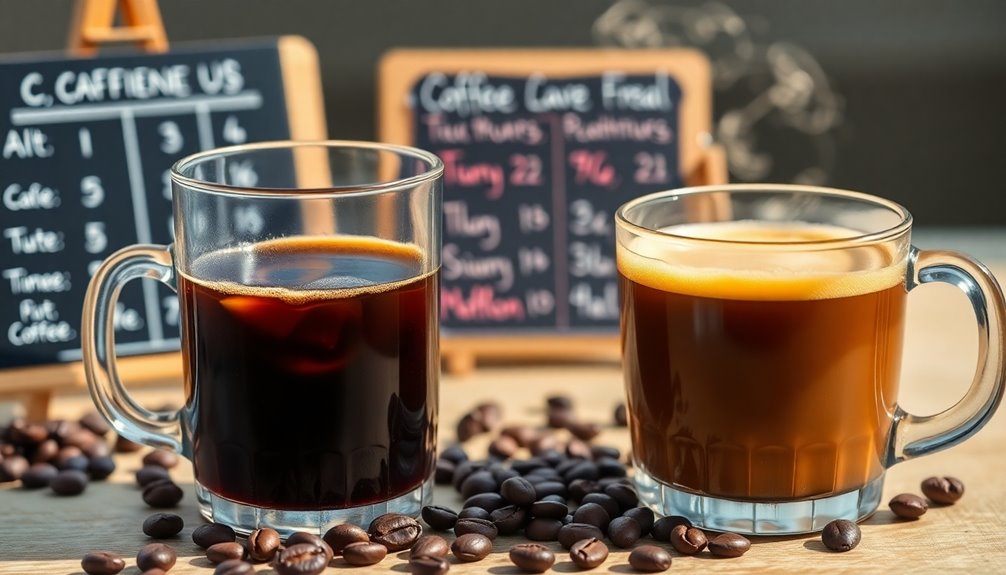
While cold brew and hot coffee each offer unique experiences, comparing them reveals key differences in taste, preparation, and caffeine content.
Cold brew typically contains around 200 mg of caffeine per 16 ounces, while hot coffee ranges from 210-360 mg. The brewing method plays a crucial role here; hot water extracts more caffeine, often making hot coffee stronger. Additionally, hot brewed coffee has higher acidity levels than cold brew, which can influence flavor perception.
Taste-wise, cold brew is smoother and less bitter than the sharper, more direct flavor of hot coffee.
Cold brew requires 6-24 hours to brew, making it less spontaneous than hot coffee, which brews in minutes.
Brewing Method Differences
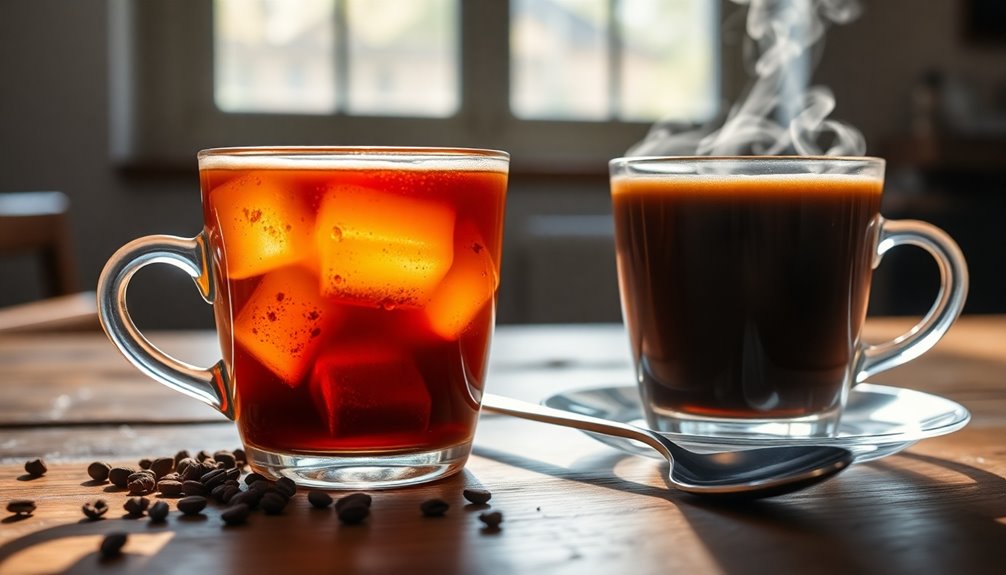
How does the brewing method impact your coffee experience? The difference between cold brew and hot coffee lies in their brewing times and temperatures.
Cold brew requires a long steeping time of 12 to 24 hours, using cold or room temperature water. This extended contact allows for more caffeine extraction, even with a coarser grind. Additionally, caffeine content in cold-brew coffee generally tends to be higher compared to hot-brewed options.
In contrast, hot coffee brews quickly, usually in four minutes or less, utilizing hot water for efficient extraction.
The grind size varies too—cold brew prefers a coarser grind, while hot brewing can use fine or medium grinds.
These brewing method differences influence not just caffeine content but also flavor profiles, giving each brew its unique taste and character. Additionally, the temperature and brewing time can affect the acidity and bitterness of the final product. For example, cold brew coffee tends to be less acidic and bitter than hot brewed coffee, resulting in a smoother and milder flavor. Similarly, the pressure used in brewing espresso can produce a more concentrated and bold flavor compared to other methods. In comparison, caffeine in Pepsi is derived from carbonation and the addition of caffeine as an ingredient rather than a brewing process. Therefore, the flavor profile of Pepsi is not influenced by the same factors as brewing methods, resulting in a different taste and character altogether.
Consumer Considerations
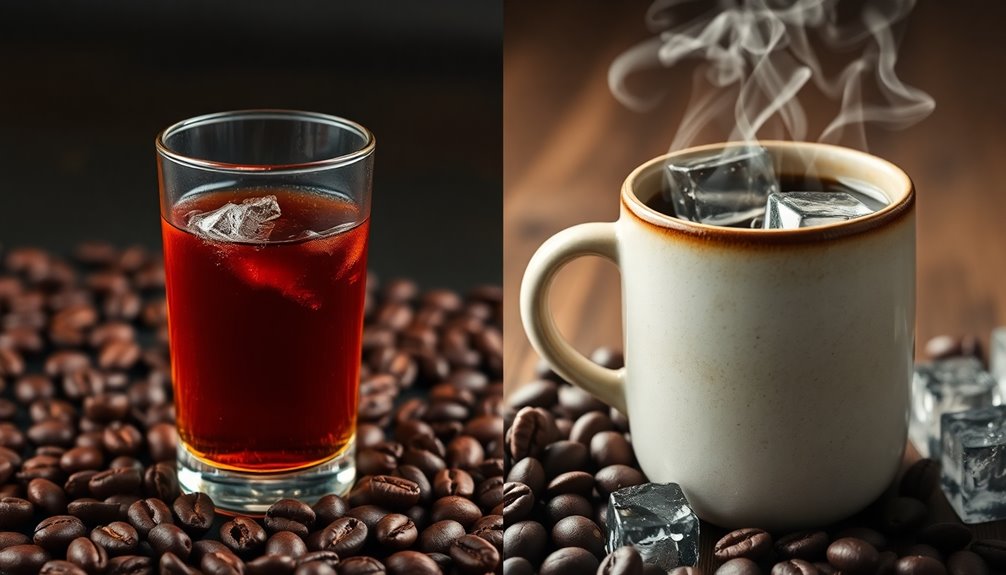
What drives your coffee choices? If you're part of the Millennial or Gen Z crowd, you might lean towards cold brew for its smooth flavor and lower acidity. It's popular among Generation X too, who appreciate its affordability and less bitter taste. You probably value convenience, and cold brew's ready-to-drink options fit perfectly into your busy lifestyle.
If you need an extra caffeine boost, cold brew packs around 200 mg in a 16-ounce serving, making it a strong contender compared to iced and hot coffees. Additionally, cold brew typically has a higher caffeine content due to the extended brewing time. However, if you're caffeine-sensitive, you may want to monitor your intake. Ultimately, your preferences reflect a growing trend towards flavorful, easy-to-enjoy beverages that cater to your fast-paced life.
Personalizing Your Brew
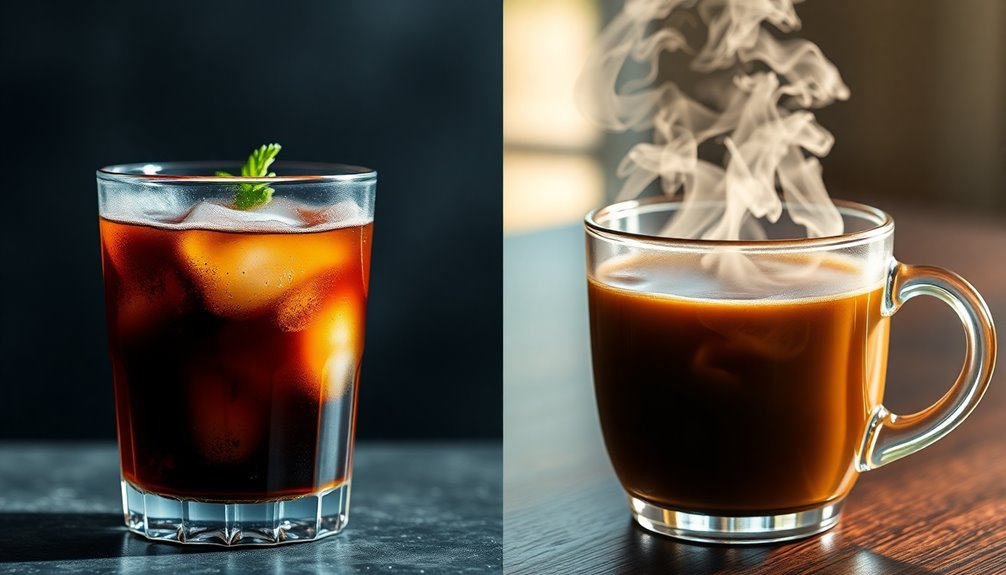
As you explore the world of coffee, personalizing your brew can transform your daily ritual into a tailored experience that suits your taste and lifestyle.
Whether you prefer full immersion methods like French Press or cold brew, you can adjust the coffee grounds to water ratio for your desired caffeine kick. For a bolder flavor, go for a higher ratio; if you like it smoother, dial it back.
Experiment with grind sizes too—medium-coarse for cold brew or fine for pour-over—to influence extraction and taste.
Remember, longer infusion times enhance caffeine extraction in cold brew, while shorter brewing periods in hot methods yield different flavors. Additionally, different brewing methods, such as cold brew, can lead to varying caffeine levels in your final cup.
Tailor these elements to create your perfect cup every time.
Frequently Asked Questions
How Does Caffeine Affect Different Individuals?
Caffeine affects individuals differently based on genetics, gender, and health conditions. If you've got the gene for higher caffeine intake, you might tolerate more without side effects.
On the other hand, if you're hypersensitive, even small amounts could lead to jitters. Hormones can also play a role; women on contraceptives often metabolize caffeine slower.
Additionally, certain medications and health issues can amplify caffeine's effects, making awareness of your body's response essential.
Can Cold Brew Cause Insomnia or Jitters?
Yes, cold brew can cause insomnia or jitters, especially if you're sensitive to caffeine.
Its higher caffeine concentration might lead to restlessness or disrupted sleep, particularly if you drink it later in the day.
Everyone's tolerance varies, so what works for one person mightn't for another.
If you notice these effects, consider diluting your cold brew or limiting your intake to avoid uncomfortable symptoms.
Always pay attention to how your body reacts.
What Health Benefits Are Associated With Caffeine?
Caffeine offers several health benefits you might find intriguing. It can boost your mood and enhance brain function, potentially reducing the risk of conditions like Alzheimer's and Parkinson's disease.
Additionally, caffeine may help with weight management by increasing metabolism and fat burning. Regular consumption might lower the risk of certain cancers and chronic diseases while promoting heart and liver health.
How Does Caffeine Tolerance Develop Over Time?
Caffeine tolerance develops over time as your body adapts to regular caffeine intake.
Initially, you may experience heightened effects, but after about two weeks, you'll notice a decrease in those benefits. Your brain chemistry changes, increasing adenosine receptors, which can diminish the physical performance boost caffeine provides.
However, cognitive benefits, like alertness and focus, often remain unaffected, allowing you to enjoy mental clarity even as your physical tolerance builds.
Are There Any Caffeine-Free Coffee Options Available?
Yes, there are plenty of caffeine-free coffee options available!
You can try decaf blends like Counter Culture's Slow Motion or Stumptown's Trapper Creek, both using the Swiss Water Process.
If you're looking for alternatives, consider mushroom elixirs or Teeccino, which mimics coffee's taste without caffeine.
Starbucks also offers caffeine-free drinks like the Vanilla Bean Crème Frappuccino.
With these choices, you can still enjoy a coffee-like experience without the jitters!
Conclusion
In the battle of cold brew versus hot coffee, it's clear that cold brew often packs a bigger caffeine punch. However, factors like brewing method and personal preferences play a significant role in your choice. Whether you crave the smoothness of cold brew or the warmth of hot coffee, consider what fits your lifestyle and taste. Ultimately, it's all about personalizing your brew to match your caffeine needs and enjoying every sip!
